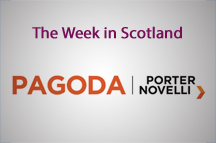 We’re used to referenda in Scotland: one in 2014, the current European referendum and possibly a repeat Scottish Independence vote in 2018.
We’re used to referenda in Scotland: one in 2014, the current European referendum and possibly a repeat Scottish Independence vote in 2018.
Debates between posh boys from Eton, or blue on blue, carry little interest in Scotland.
It’s only since the Leave campaign took a poll lead, coupled with First Minister Nicola Sturgeon’s TV debate with Boris that interest has deepened. 2014 No voters will have been amused to see how well the First Minister has mastered the arguments in favour of the UK remaining part of the EU; exactly the same arguments that the No side made in favour of Scotland remaining part of the UK!
The latest polling by Ipsos MORI has found that the gap between the two sides has narrowed in the past six weeks. Support for Remain has fallen from 66% to 53% while backing for Leave has risen from 29% to 32%. Amongst those certain to vote the gap increases to 58%-33%.
The key factor influencing Scottish voters is the belief that exiting from the EU would damage the economy, their personal standard of living, public services and exiting would negatively affect both Scotland’s, and the UK’s, influence in the world.
 So what could happen if Scotland votes to stay and the UK decides to leave? The SNP’s manifesto said Brexit could lead them to support a second referendum. Speaking before the Scottish election Nicola Sturgeon said “If we are taken out of the EU against our will I will want to give the Scottish people the opportunity to protect our EU membership by looking again at the question of independence”. However, she has since modified her position saying that, while she believes in independence, she “also supports Scotland being in the EU whether as an independent country or part of the UK”.
So what could happen if Scotland votes to stay and the UK decides to leave? The SNP’s manifesto said Brexit could lead them to support a second referendum. Speaking before the Scottish election Nicola Sturgeon said “If we are taken out of the EU against our will I will want to give the Scottish people the opportunity to protect our EU membership by looking again at the question of independence”. However, she has since modified her position saying that, while she believes in independence, she “also supports Scotland being in the EU whether as an independent country or part of the UK”.
The latest poll also shows that while the majority of Scots don’t back a rerun of the 2014 Independence referendum, 47% would favour a second plebiscite with 45% against and 8% undecided.
Alex Salmond, Sturgeon’s predecessor, has repeatedly taken to the airwaves to warn that a Brexit vote would “inevitably” lead to a second Scottish vote giving rise to speculation that Salmond is undermining his successor by giving not too subtle hints to SNP supporters to vote to leave.
Indeed polls show that around 33% of SNP supporters back Brexit. And their intention to do so will have been strengthened by injudicious remarks by George Osborne that a Remain vote would take independence "off the table" for a generation and Johnson’s assertion that “Scotland has no appetite whatsoever” for a second referendum.
Will there be a second Scottish referendum if the UK votes to leave? Probably not. Concerns about the Scottish economy are growing and the SNP lost in 2014 because of their failure to convince Scots that the economic case for independence was sufficiently strong.
But should Boris Johnston become PM, who knows? As we say in Scotland, the ball would be back on the slates! Roughly translated “plans have come apart”.












